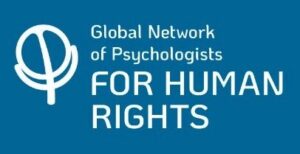
Editor’s Note
The focus in this month’s Bulletin is on the International Literacy Day, September 9.
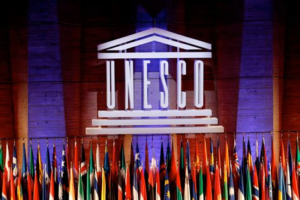
Table of Contents
SPECIAL SECTION
SPECIAL FOCUS on International Literacy Day, September 9
https://www.unesco.org/en/literacy/need-know
Since 1967, International Literacy Day (ILD) celebrations have taken place annually around the world to remind the public of the importance of literacy as a matter of dignity and human rights, and to advance the literacy agenda towards a more literate and sustainable society.
Despite steady progress made across the world, literacy challenges persist with at least 763 million young people and adults lacking basic literacy skills in 2020. The recent COVID-19 crisis and other crisis, such as climate change and conflicts, have been exacerbating the challenges.
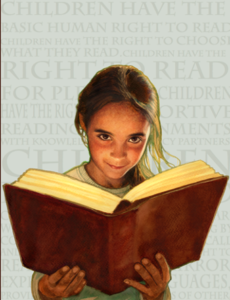 The Case for Children’s Rights to Read
The Case for Children’s Rights to Read
International Literacy Foundation, 2018.
- Children have the basic human right to read.
- Children have the right to access texts in print and digital formats.
- Children have the right to choose what they read.
- Children have the right to read texts that mirror their experiences and languages, provide windows into the lives of others, and open doors into our diverse world.
- Children have the right to read for pleasure.
- Children have the right to supportive reading environments with knowledgeable literacy partners.
- Children have the right to extended time set aside for reading.
- Children have the right to share what they learn through reading by collaborating with others locally and globally.
- Children have the right to read as a springboard for other forms of communication, such as writing, speaking, and visually representing.
- Children have the right to benefit from the financial and material resources of governments, agencies, and organizations that support reading and reading instruction.
We’re the World Literacy Foundation
We envision a world in which every one of us can read and write, in which there is free access to education for all.
The World Literacy Foundation is a global a non-profit organization striving to ensure that every child regardless of geographic location has the opportunity to acquire literacy skills and books to reach their full potential – succeeding at school and beyond.
Literacy is a Right. 750 Million People in the World are Illiterate – World Literacy Foundation
At the World Literacy Foundation, we believe in literacy as the foundation of lifelong learning and education. People who cannot read or write experience difficulties with simple everyday tasks such as reading the label of a medicine bottle, filling in a job application or understanding a traffic sign. When we help someone to acquire literacy skills, we are empowering them to access to better opportunities in life to break the poverty cycle.
The Impact of Illiteracy: – Economic Impact – Social Impact – Health Impact
GNPHR NEWS AND EVENTS
GNPHR Announces New Award
- Education in Human Rights & Psychology Recognition Award.
This award acknowledges outstanding educational materials for human rights education for psychologists. See more and submit a nomination here: Education in Human Rights Award

Psychology Organizations and Human Rights
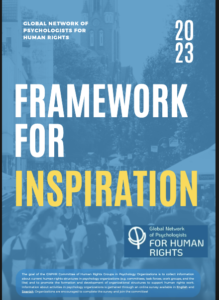
- GNPHR Network of Human Rights Committees in Psychology Organizations
We would like to share with you a new document from the Global Network of Psychologists for Human Rights. This document was produced by a working group that include psychology associations with existing human rights committees and similar structures. It is called ‘ A Framework for Inspiration’ and includes accounts of the ways psychologists and psychology associations have been promoting and defending human rights in different countries around the World. We hope you find it useful and would welcome your comments on the ideas it presents and would be happy to discuss any questions you have.Please send comments/questions to Tony Wainwright, T.W.Wainwright@exeter.ac.uk. See here: online booklet or downloadable PDF
Webinar Series Human Rights Education
Next Webinars:
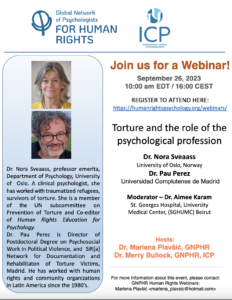 Dr. Nora Sveaass & Dr. Pau Perez – Torture and the Role of the Psychological Profession.
Dr. Nora Sveaass & Dr. Pau Perez – Torture and the Role of the Psychological Profession.
September 26, 2023, 10 am EDT / 4 pm CEST / 14:00 UTC
Register: https://us02web.zoom.us/webinar/register/WN_fU8o7h1cSnmDtjqjbbOWaw#/registration
For past Webinars, see: https://humanrightspsychology.org/webinars/
CONTENT AREAS AND NEWS
Academic Freedom / Higher Education
 UN side event pushes for academic freedom guidance
UN side event pushes for academic freedom guidance
[posted August 6, 2023]. July 11th, SAR led a UN Human Rights Council (HRC) side event on academic freedom, as part of the HRC’s 53rd Session, at the UN Palais de Nations in Geneva. The event was co-sponsored by the UN Missions for Uruguay, France, the European Union, and Portugal. The event, titled From words to action: Implementing Academic Freedom under UN Human Rights Standards, was intended to generate authoritative guidance – from states, UN actors, and other stakeholders – on practical implementation of the right to academic freedom.
The side event follows from a number of significant recent developments, including most recently the Joint Statement on Academic Freedom led by France and South Africa, and signed on to by more than 70 countries during the March HRC Session. Jesse Levine moderated the panel, which included Eamon Gilmore, the European Union Special Representative for Human Rights; Farida Shaheed, the UN Special Rapporteur for the Right to Education; Mikel Mancisidor, a member of the UN Committee on Economic, Social and Cultural Rights; Hector Ulloa, the outgoing president of the Norwegian Students’ and Academics’ International Assistance Fund; and Ambassador Álvaro Moerzinger Pagan, the Permanent Representative of Uruguay to the United Nations in Geneva.
Children/Youth
Chile’s stolen children: How they were taken and adopted to families in the US and beyond
While exact number of cases is unknown, human rights groups believe at least 20,000 babies were taken between the 1960s and 1990s. Amanda Lee Myers, USA TODAY, 28 June 2023.
Between the 1960s and 1990s in Chile, human rights groups believe that upwards of 20,000 babies were taken from mostly low-income mothers and adopted out to unsuspecting parents in foreign countries. The practice amounted to an elaborate human-trafficking operation that involved a network of midwives, doctors, social workers, nuns, priests and judges, many of whom got rich off the scheme while fulfilling a key goal of Gen. Augusto Pinochet’s regime to make Chile an economic success. Here’s what you need to know about Chile’s stolen babies, how the scheme worked and what’s being done to address the wrongs of the past: Four babies.
Strengthening sexual and reproductive health education for children and adolescents in China.
Zhiyong Zou, Yanhui Dong, Yi Song, Jun Ma. The Lancet, July 25, 2023.
https://doi.org/10.1016/S2352-4642(23)00138-4
In China, the burden of sexually transmitted infections (STIs), including HIV, among children and adolescents is increasing, presenting new characteristics and challenges. Despite progress in reducing HIV infection and deaths in adults, the incidence of HIV infection in children and adolescents (aged 6–22 years) has risen, from 0·27 per 100 000 in 2008 to 1·49 per 100 000 in 2017, representing an alarming annual increase of 21·9%. The latest surveillance data also indicate a steady increase in incidence of gonorrhoea (from 0·38 per 100 000 in 2012 to 0·93 per 100 000 in 2017) and syphilis (from 0·65 per 100 000 to 0·99 per 100 000 in the same period) in the 6–22 years age group.
Climate Justice
The Climate Crisis, Climate Anxiety and Children’s Rights: A Psychological Perspective on Human Health and Security
Michelle B. Cowley-Cunningham, Alexis Carey, Elaine Rogers, Irish Studies in International Affairs 34(1):1-13, August 2023.
The climate crisis affects children’s well-being and threatens future generations’ enjoyment of the right to the highest standard of health and security. This paper discusses a submission by the PSI Special Interest Group in Human Rights and Psychology to the UN Committee on the Rights of the Child. As health profession stakeholders we highlight how environmental degradation and children’s awareness of climate change present an important linkage to children’s mental health. We provide a psychological health account of climate anxiety and its effects on children, and a psychological perspective on the UN Convention on the Rights of the Child regarding health and participation. We detail how interventions mindful of children’s educational and participatory capacity offer the potential to moderate effects of climate anxiety. We discuss limitations of the term ‘climate anxiety’ for describing the experience of children from the Global South, preferring a narrative of physical and mental health parity.
The climate crisis and violence against children
Jorge Cuartas et al.. The Lancet, June 12, 2023.
The existential threat posed by climate change is growing. Human activities and inadequate action by governments, corporations, and global organisations continue to lead to unprecedented levels of environmental stress. These effects are disproportionately high in low-income and middle-income countries and communities facing pre-existing inequities and vulnerabilities.
Crimes against humanity
New Film – Descendant
- Descendant review – powerful Netflix documentary on the legacy of slavery
A striking and sensitive film about how an illegal slave ship led to an Alabama community of inherited trauma but also defiance. Lauren Mechling, The Guardian, 21 October 2022.
Descendent, Margaret Brown’s documentary about the search for America’s last known slave ship, begins with a distant figure kayaking through a sun-dappled swamp. Green leaves blanket the water’s surface and the rower’s strokes are slow and meditative. Nothing to see here, just a man – a Black man, we gather, as he glides closer – in nature, accompanied by the buzz of insects and the lone egret that is keeping watch. It’s a strikingly bucolic beginning for a work about so devastating a subject. We’re in for something different here, is the film’s opening gambit. It’s an unspoken promise that Descendent lives up to. -
New Doc Gives Voice to the Descendants of the Last Known Ship to Smuggle Stolen Africans to the US
Netflix, John DiLillo, September 29, 2022.
Finding the shipwreck was just the beginning. The trailer for Descendant shows that it’s about much more. In 1860, 110 people from the West African country now known as Benin were illegally transported to Mobile, Alabama, aboard The Clotilda, a ship that was burned by its owner, Timothy Meaher, to cover up his crimes. More than a century later, Margaret Brown’s new documentary Descendant tells the story of the families of those brought over on The Clotilda, who now form the community of Africatown, and how the recent discovery of the shipwreck has compelled them to grapple with a century of mythmaking, the lasting forces of oppression and a shared path toward justice.
International Day for the Remembrance of the Slave Trade and its Abolition
23 August 2023.
On the night of 22 to 23 August 1791, in Saint Domingue, today the Republic of Haiti, saw the beginning of the uprising that would play a crucial role in the abolition of the transatlantic slave trade. It is against this background that the International Day for the Remembrance of the Slave Trade and its Abolition is commemorated on 23 August each year. This International Day is intended to inscribe the tragedy of the slave trade in the memory of all peoples.
In accordance with the goals of the intercultural project “The Routes of Enslaved Peoples”, it should offer an opportunity for collective consideration of the historic causes, the methods and the consequences of this tragedy, and for an analysis of the interactions to which it has given rise between Africa, Europe, the Americas and the Caribbean.
Since its launch in 1994, the UNESCO “Routes of Enslaved Peoples: Resistance, Liberty and Heritage” Project has contributed to the production of innovative knowledge, the development of high-level scientific networks and the support of memory initiatives on the theme of slavery, its abolition and the resistance it generated. At the international level, the project has thus played a major role in “breaking” the silence surrounding the history of slavery and placing this tragedy that has shaped the modern world in the universal memory.
Today, among its major objectives, the project contributes to “de-racialising” our vision and “decolonising” our imaginations of the world by
- deconstructing the discourses based on the concept of race that justified these systems of exploitation,
- promoting the contributions of people of African descent to the general progress of humanity, and
- questioning the social, cultural and economic inequalities inherited from this tragedy.
The code noir (The black code)
“THE CODE NOIR (THE BLACK CODE),” in World History Commons, https://worldhistorycommons.org/code-noir-black-code [accessed September 9, 2023
The Code noir initially took shape in Louis XIV’s edict of 1685. Although subsequent decrees modified a few of the code’s provisions, this first document established the main lines for the policing of slavery right up to 1789. The very first article expels all Jews from the colonies; Jews played a significant but hardly dominant role in the Dutch colonies of the Caribbean region but were not allowed to own property or slaves in the French colonies. The edict also insisted that all slaves be instructed as Catholics and not as Protestants. For the most part, the code concentrated on defining the condition of slavery (passing the condition through the mother not the father) and establishing harsh controls over the conduct of those enslaved. Slaves had virtually no rights, though the code did enjoin masters to take care of the sick and old.
Wie jesidische Frauen in Baden-Württemberg zurück ins Leben finde Nach Versklavung durch den IS. [How Yazidi women in Baden-Württemberg find their way back to life after enslavement by the ISIS].
S. Susanne Babila, SWR Aktuell, 3 August, 2023.
Als eine der ersten Jesidinnen kam Zeytun Alsilo auf der Flucht vor dem Islamischen Staat 2015 nach BW. Mittlerweile ist sie gut integriert, doch Ängste und Traumata bleiben.
“Man kann es nicht vergessen, aber man muss trotzdem aufstehen”, sagt die 32 Jahre alte Zeytun Alsilo über die schlimmste Zeit ihres Lebens. Gemeint ist der Völkermord an den Jesiden, der am 3. August 2014 im Nordirak begann und der letztlich dafür sorgte, dass die junge Jesidin 2015 nach Baden-Württemberg kam. Insgesamt waren es 1.100 Frauen und Mädchen, die dank eines sogenannten Sonderkontingentes im Land aufgenommen wurden. Nun zeigt sich: Viele von ihnen haben in der neuen Heimat Fuß gefasst – wie Zeytun Alsilo.
Psychologische Begleitung für geflüchtete Jesidinnen
Was diese Angst in den Flüchtlingslagern bewirken kann, weiß Jan Ilhan Kizilhan von der Dualen Hochschule Baden-Württemberg (DHBW). Der Leiter des Instituts für Transkulturelle Gesundheitsforschung hat die etwa 1.100 Frauen und Kinder, die über das Sonderkontingent nach Baden-Württemberg gekommen sind, psychologisch begleitet. “Diese Perspektivlosigkeit führt dazu, dass wir dort ein höheres Suizidrisiko haben und dass sich viele Menschen, vor allem junge Frauen und Mädchen, sich das Leben genommen haben”, sagt Kizilhan. Es gebe aber auch viele Männer mit Depressionen. Auf Dauer könne man kaum in einem Flüchtlingslager leben, so der Psychologe, der selbst regelmäßig vor Ort ist.
Translation:
Zeytun Alsilo was one of the first Yazidis to come to Baden-Württemberg in 2015, fleeing a genocide begun by the Islamic State against Yazidis in 2014. She is now well integrated, but fears and trauma remain. “You can’t forget it, but you still have to get up,” says 32-year-old Zeytun about the worst time in her life. A total of 1,100 women and girls were accepted into Germany under a “special” quota. By now, many, like Zeytun Alsilo, have tried to gain a foothold in their new homeland.
Psychological support for refugee Yazidis
Jan Ilhan Kizilhan, Baden-Württemberg Cooperative State University (DHBW) knows of the fear and anxiety in refugee camps. Dr. Kizilhan, head of the Institute for Transcultural Health Research provided psychological support to the women and children who came to Baden-Württemberg via the special quota. [there is] a higher risk of suicide and many people, especially young women and girls, have taken their own lives,” says Kizilhan. There are also many men with depression. According to the psychologist, who is regularly in the camps himself, it is hardly possible to live in a refugee camp over the long term.
See also ICP Webinar with Jan Kizilhan here: https://icpweb.org/icp-webinars/#kizilhan
Human Rights Education
Bringing Human Rights into the Heart of Psychology and Social Work Education.
Peter Dijkstra and Polli Hagenaars. In: Emancipatory Human Rights and the University (Ch.11), Promoting Social Justice in Higher Education.
Eds: Felisa Tibbitts and Andre Keet, Routledge, August 2023.
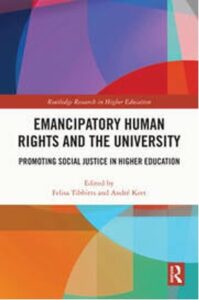 Emancipatory Human Rights and the University.
Emancipatory Human Rights and the University.
Eds: Felisa Tibbitts and Andre Keet, Routledge, August 2023.
This volume explores the application of human rights to higher education through a critical lens. Combining theoretical and applied perspectives, it asks what a human rights framework grounded in liberation and justice can offer to ways of working and teaching practices in higher education.
LGBTQI+, Gender Rights
Safeguarding LGBTQ+ lives in an epoch of abandonment
Willem E. Rosa, Nicholas Metheny, Alic G. Shook, Adebola A. Adedimeji, The Lancet Open Access, September 2023.
Policy-sanctioned threats to the lives and welfare of LGBTQ+ people are becoming increasingly volatile. Despite the commitment of UN member states to “leave no one behind” as a key ethic of the Sustainable Development Agenda. LGBTQ+ populations are being actively marginalised further. 66 jurisdictions worldwide criminalise private, consensual, same-sex activity between men; 41 countries enact the same punishment for women; and 12 countries impose or can impose the death penalty for same-sex activity. Another 14 countries criminalise trans people’s gender identity or expression. An emerging global movement of homophobia, transphobia, and human-rights violations is pervading throughout countless nations, regardless of their income level, predominant religious practices, or governments.
On June 5, 2023, the Human Rights Campaign declared a state of emergency for all LGBTQ+ Americans, citing 525 state-level bills targeting LGBTQ+ populations in the USA. In 2023, 75 such bills have been signed into law—doubling legalised discrimination since 2022. These policies restrict educators from discussing LGBTQ+ issues, prohibit mental health workers from providing gender-affirming care to people under the age of 18 who have gender dysphoria, and criminalise parents who seek the medical care that they believe will best support the wellbeing their children.
Putin’s Crackdown Leaves Transgender Russians Bracing for Worse.
Neil MacFarquhar and Georgy Birger, NY Times, August 1, 2023.
A new law underscores how Vladimir V. Putin is increasingly using the war in Ukraine as justification for greater restrictions on L.G.B.T.Q. life, portraying it as a consequence of deviant Western values.
The latest crackdown came last week when President Vladimir V. Putin signed a law that criminalized all surgery and hormone treatments used for gender transitions. That law comes on top of a measure enacted last December prohibiting the representation of L.G.B.T.Q. relationships in any media — streaming services, social platforms, books, music, posters, billboards and film. He took aim at questions of gender identity as well as sexual orientation, regularly denigrated transgender people in his speeches, mocking the idea of “Parent No. 1 and Parent No. 2” instead of “mom and dad,” and suggested that the West sought to make the world adopt “dozens of genders.” The new law bans all gender transitions as well as changing genders on official documents like passports. It became harsher as it proceeded in Russia’s Parliament; typically a rubber stamp for Mr. Putin’s favored legislation, it overwhelmingly passed the law. The final version annuls marriages when one spouse changes gender and bans adoptions by such couples.
The law essentially removes the ability of transgender people to control their own bodies, rights activists said, and even if people had the means to travel abroad seeking surgery, which many do not, they would not be allowed to update official documents. Having the wrong gender on identification papers would create hurdles in countless aspects of life such as employment and travel.
Mental Health and Human Rights
Afghan mental health and psychosocial well-being: thematic review of four decades of research and interventions
Published online by Cambridge University Press, 10 July 2023. 30 authors, among which Qais Alemi and Peter Ventevogel.
Four decades of war, political upheaval, economic deprivation and forced displacement have profoundly affected both in-country and refugee Afghan populations.
The number of countries affected by armed conflict and forced displacement is expected to rise over the next decade, resulting in challenges to human development and socioeconomic integration. Key concerns pertain to the mental health of conflict-affected populations, systems of psychiatric care and the effectiveness of interventions to support psychosocial well-being. This article presents a synthesis of extant literature on mental health issues, systems of care and culturally relevant interventions for conflict-affected Afghans. It is authored by 30 scholars, practitioners and programme managers, mostly Afghan nationals, who led work on Afghan mental health and psychosocial support (MHPSS). We sought to document significant accomplishments to date, and provide a comprehensive overview to support MHPSS initiatives relevant to Afghans and conflict-affected people globally.
Combatting intergenerational effects of psychotrauma with multifamily therapy
Trudy Mooren, Elisa van Ee, Irma Hein, Julia Bala, Front. Psychiatry 13:867305, February 2023.
There is growing evidence that parental trauma is associated with psychosocial disorders, externalizing and internalizing problems, and higher sensitivity to posttraumatic stress disorder (PTSD) in children. Recent research findings suggest multidimensional relational, psychological, and neurobiological interrelated pathways of intergenerational influence. Moreover, the intergenerational effects of parental trauma need to be understood within a broader systemic context, as a part of family adaptation. This article explores research findings and clinical practice to enhance our understanding of intergenerational processes and presents directions for therapeutic interventions. A trauma-focused multi-family therapy, aiming to restrict the relational consequences of parental trauma and strengthen family resilience, is described. The proposition is that to facilitate and improve the quality of parent–child interaction in response to psychotrauma, fostering emotion regulation capacities and mentalization is crucial. These efforts offered through family group interventions may benefit various families coping with adversity in culturally diverse societies.
Acculturation and Psychopathology
Gail M. Ferguson, José M. Causadias & Tori S. Simenec, Annual Review of Clinical Psychology, 19:381-411 2023.
Acculturation and psychopathology are linked in integrated, interactional, intersectional, and dynamic ways that span different types of intercultural contact, levels of analysis, timescales, and contexts. A developmental psychopathology approach can be useful to explain why, how, and what about psychological acculturation results in later adaptation or maladaptation for acculturating youth and adults. This review applies a conceptual model of acculturation and developmental psychopathology to a widely used framework of acculturation variables producing an Integrated Process Framework of Acculturation Variables (IP-FAV). This new comprehensive framework depicts major predisposing acculturation conditions (why) as well as acculturation orientations and processes (how) that result in adaptation and maladaptation across the life span (what). The IP-FAV is unique in that it integrates both proximal and remote acculturation variables and explicates key acculturation processes to inform research, practice, and policy.
Universal health coverage is a matter of equity, rights, and justice
Gabriela Cuevas Barron, et al. The Lancet, July 7, 2023.
The Coalition of Partnerships for Universal Health Coverage and Global Health calls on all countries to urgently reinvigorate progress towards health for all. We know that the world is not well prepared for the next pandemic, or for threats posed by climate change, zoonosis, and increased conflicts. We also know that vulnerable and marginalised populations are hardest hit when an emergency strikes: women; children and adolescents; LGTBQI+; indigenous people; incarcerated people; people living with non-communicable diseases, mental health conditions, and comorbidities; refugees and internally displaced migrants; people living in remote rural areas; and millions of people living in low-income and middle-income countries with fewer socioeconomic safety nets. Inequity is one of the greatest challenges of our times. When entire population groups cannot access essential health services, including prevention and response services in times of crisis, we are not protecting and delivering on the right to health.
Migration, Refugees, Displacement, Statelessness
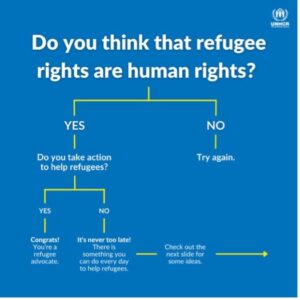
Search‑and‑rescue in the Central Mediterranean Route does not induce migration: Predictive modeling to answer causal queries in migration research
Rodríguez Sánchez, A., Wucherpfennig, J., Rischke, R. et al. Nature, Sci Rep 13, 11014 (2023).
State- and private-led search-and-rescue are hypothesized to foster irregular migration (and thereby migrant fatalities) by altering the decision calculus associated with the journey. We here investigate this ‘pull factor’ claim by focusing on the Central Mediterranean route, the most frequented and deadly irregular migration route towards Europe during the past decade. Based on three intervention periods—(1) state-led Mare Nostrum, (2) private-led search-and-rescue, and (3) coordinated pushbacks by the Libyan Coast Guard—which correspond to substantial changes in laws, policies, and practices of search-and-rescue in the Mediterranean, we are able to test the ‘pull factor’ claim by employing an innovative machine learning method in combination with causal inference.
Women
Mimi was sold to a pimp. Now she fights people-traffickers in Niger. How will the coup affect the battle against the trans-Saharan slave trade?
Robert Guest and Kinley Salmon, The Economist, Aug 7th 2023.
Alone tree rustles in the hot desert breeze, every branch festooned with black plastic bags. At first glance, it looks like a piece of installation art: a striking protest against those who fail to dispose properly of their rubbish. But if you look around, practically every tree in the area is decorated with black plastic, blown into branches by the wind. So is every barbed-wire fence. In Agadez, a city in Niger, rules against littering are not respected.
Agadez is lawless in other ways, too, as Mimi well understands. She is a woman in her 20s from Nigeria, the vast country south of Niger. Three years ago she and her three sisters were trafficked into sexual slavery. Now Mimi is a whistleblower in Agadez. The city was for centuries a hub of the caravan trade across the Sahara; recently it has become better known as a staging post for African migrants heading for Europe.
Mimi has been trying to catch the worst of the people-smugglers: the ones who force young women into prostitution. Her story is a snapshot of how ordinary, decent people try to cope in a region rocked by political violence, and preyed on by criminals who take advantage of the chaos. On July 26th the democratically elected president of Niger was ousted in a coup, the upshot of which was still unclear as this article was published.
‘Don’t let the other soldiers watch’: Rape as weapon in Sudan war
Nils Adler and Dallia M Abdelmoniem, Al Jazeera, 14 Aug 2023.
It started as a trickle, but the whispers about rapes soon became a flood. Fear took hold across Sudan, in the grip of heavy fighting since April 15.
On one side are militiamen of the Rapid Support Forces (RSF), a paramilitary with a deeply violent history that gained power in the last few decades. On the other side are the Sudanese Armed Forces (SAF), formerly allied with the RSF but now locked in an existential fight with them.
Trapped between them are millions of Sudanese – in particular, the women.
He kept calling me sister: ‘You’re my sister, you’re an Arab girl, you’re safe.’
But then he’d flip and call me a liar, say that I wasn’t from the area, and who was I, really?
The survivors of sexual violence and their families are trapped in more ways than one, between their trauma and the ruined infrastructure the fighting leaves behind.
The RSF has bases in urban neighbourhoods and has taken control of more areas, sending residents fleeing, according to Mohamed Salah, one of the Emergency Lawyers, a group that used to provide pro bono representation to activists and protesters and documents abuses and coordinates help for victims.
Ukraine
‘They enjoyed this’: Ukrainian woman recounts five-month nightmare of torture and imprisonment
Dan Sabbagh, The Guardian, 18 June 2023.
Russian occupiers have unleashed a reign of terror in the city of Enerhodar, detailed here by one survivor of the secret police. Olena Yahupova was first taken by the Russian occupiers in the Ukrainian city of Enerhodar last October. Neighbours she knew had informed on her, telling the FSB secret police that her husband was a Ukrainian military officer. What followed, she says, was two days of torture with the secret police – which turned out to be only a prelude to a nightmare of five months of detention and forced labour, during which she also had to act in faked news clips.
PUBLICATIONS
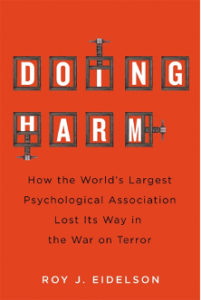 Doing Harm. How the World’s Largest Psychological Association Lost Its Way in the War on Terror
Doing Harm. How the World’s Largest Psychological Association Lost Its Way in the War on Terror
Roy Eidelson, McGill-Queens’ University Press, September 2023
In the months after 9/11 it became clear that the White House, the Department of Defense, and the Central Intelligence Agency were prepared to ignore well-established international law and human rights standards in prosecuting the war on terror. It was less clear, however, that some of Eidelson’s fellow psychologists would become part of the abusive and torturous operations at overseas CIA black sites and Guantanamo Bay. Nor was it initially clear that this ruthless enterprise would garner acquiescence and support from the APA’s leadership.
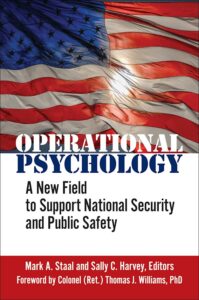 Operational Psychology: A New Field to Support National Security and Public Safety
Operational Psychology: A New Field to Support National Security and Public Safety
Mark A. Staal, Sally C. Harvey, ABC-CLIO, 24 June 2019.
Details the growth, roles, and applications of this new specialty aiming to protect American national and public well-being in the face of increasing and novel threats both inside and outside the United States.
In this age of asymmetric warfare, increasing home-grown terrorism, and continuing threats from abroad, a new specialty has emerged and expanded—operational psychology.
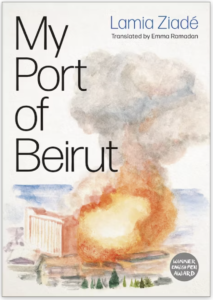 My Port of Beirut, by Lamia Ziadé, translated from the French by Emma Ramadan
My Port of Beirut, by Lamia Ziadé, translated from the French by Emma Ramadan
Lamia Ziadé’s illustrated book about the 2020 port explosion in Beirut is a personal, impassioned account of a crime committed against the Lebanese people. (Ursula Lindsey).
OPPORTUNITIES
Exhibits, Events, Courses, Calls for Papers
 HDCA 2023 Conference, “Vulnerability, human development and cooperative re-building in turbulent times”, 11 – 13 September, 2023, Sofia, Bulgaria and Online. More information about the conference is available at:
HDCA 2023 Conference, “Vulnerability, human development and cooperative re-building in turbulent times”, 11 – 13 September, 2023, Sofia, Bulgaria and Online. More information about the conference is available at:
Trauma, Crisis and Conflict: Connecting Research and Practice
Gooiland Event Venue, Hilversum, The Netherlands. 28 & 29 September 2023
ARQ celebrates its 50th anniversary. We are proud to invite you to our international conference on the occasion of ARQ’s 50th anniversary. Two days of sharing knowledge and discussing the importance of recognizing, preventing and treating the consequences of trauma, crises and conflict in a globally connected world. ARQ helps with shocking events and psychotrauma. We offer people and organisations customised care, advice and share knowledge. ARQ has all psychotrauma expertise under one roof and is therefore unique in the world.
CONTACTS: Published by the Global Network of Psychologists for Human Rights – www.humanrightspsychology.org
Disclaimer: The website of the Global Network of Psychologists for Human Rights (GNPHR) contains articles, events and news about the domain where psychology and human rights intersect. The information presented in this Bulletin, does not imply that the GNPHR shares the views and beliefs in the articles.
- @GNPHR1
- How to get involved – read how you can contribute to the global network
- Consider contributing a Blog/Commentary
- News and Bulletins from the GNPHR – Subscribe to GNPHR
- Email addresses:
Ways to Participate in Global Network Activities
- Student/young person representation on the GNPHR Steering Committee
Are you a student or young person (under 35 years of age) interested in joining the GNPHR Steering Committee? The GNPHR invites applications. Role description: The terms of reference broadly define the roles of all members of the steering group. Individual steering committee member tasks include : Each member will take responsibility for one of the following: (a) A specific content area or group of areas; (b) A specific project (e.g. survey of human rights reporting mechanisms; survey of educational programs in psychology/human rights, etc); (c) A specific function: for example, organizing a newsletter; soliciting commentary or newsletter blogs; seeking grant possibilities; outreach to general human rights organizations; outreach to psychology organizations or (d) Consultation: Working in collaboration with other organisations where there is a specific issue. In addition, from time-to-time, short-term subgroups may work on specific projects. In addition, for the student member, there would be a specific remit to liaise with other organisations that are focussed on younger people, psychology and human rights. Click here if you are interested in being nominated. - Share Your Experiences and Examples
One of the best ways to illustrate the intersection of psychology and human rights is through example. We are looking for examples of your encounters with human rights issues in your professional life. You might describe a time when you protected (or failed to protect) human rights, or advocated for what you saw as a human rights issue. The events might be in your clinical, research, academic, applied, or volunteer work. Please send your narrative / story (500-1000 words) to Marlena Plavšić (marlena_plavsic@hotmail.com). We will compile these for publication in the GNPHR Bulletin and on the website. Please also indicate if you would like your stories to remain anonymous. - Share your Expertise and Opinions
We invite you to contribute a blog or opinion piece on general human rights issues; human rights education or strategies for raising the profile of human rights within psychology or your professional life. Students are welcome to contribute, including on student needs for learning about and addressing human rights. Please contact the GNPHR Blog editor (blogeditor@humanrightspsychology.org) with ideas for the article you would like to write! - Send articles/news/events
If you come across a human rights article or news, or know of an upcoming hunman rights event, please send for publication in the Bulletin. Send to the Bulletin editor Polli Hagenaars (polli.hagenaars@gmail.com).

